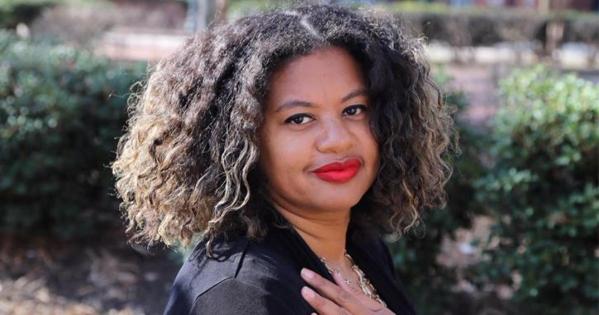Natalie Hopkinson Brings Unique Expertise to New Role at SOC

To be a writer is to be a professional witness, says new American University School of Communication (AU SOC) Associate Professor of Media, Democracy and Society Natalie Hopkinson.
Last semester, the writer, scholar, and activist is teaching Global Journalism in the 21st Century (COMM-445) after being in what she calls “PhD Land” for the past six years. Hopkinson has reconfigured the course to introduce a wide breadth of experiences, from class visits by a Middle East war correspondent covering war and gender-based issues and Dalit journalists to student-conducted interviews of photographers taking part in a festival in the Ivory Coast. This semester, Hopkinson is teaching Feature Article Writing (COMM-325) and Musical Cultures and Industries (COMM-468).
Born in Canada and emigrating to the U.S. later in her childhood, Hopkinson’s integration into the uniquely American Black-White paradigm was not an easy one. In order to understand such tense race relations in the States, she became quiet – learning to watch and listen carefully to understand culture and its unspoken rules and codes. Gradually acclimating to these cultural cues, Hopkinson occupied a distinctive identity as a third-culture kid.
Growing up as a third-culture kid, Hopkinson gradually acclimated to the cultural cues in the United States, but this process was by no means easy. Reading "The Autobiography of Malcolm X" in her preteens taught her how to see both herself and the world differently, and demonstrated the significance of first-person writing. After writing – or rather, journaling – became a way to process the world, becoming a scholar seemed like the natural evolution to her growing affinity to her new hobby.
In 2006, Hopkinson released her first book, Deconstructing Tyrone: A New Look at Black Masculinity in the Hip-Hop Generation, with Natalie Moore. “It was like we shared a brain for a whole year,” Hopkinson recalls, “No ego, just a harmony to get it done.”
Six years later, Hopkinson was back in the writer’s seat with her dissertation Go-Go Live: The Musical Life and Death of a Chocolate City. By “living with the ideas,” Hopkinson was able to collaborate with and support go-go artists through activism as co-founder of the Don’t Mute DC Go-Go Music and Culture movement, resulting in updates to legislation and stimulus plans for local artists. The source materials for her book are included in the DC Public Library’s Go-Go Archives.
Her latest book, A Mouth is Always Muzzled (2018) told the intricate stories of global art, history, and social change through her parents’ native Guyana. In 2020, Mayor Muriel Bowser appointed her to the District of Columbia Commission on the Arts and Humanities, where she challenged longstanding arts policies in the District of Columbia that marginalized non-European artists.
The seeds of her next project have already been planted. In the last year, Hopkinson has been conducting oral histories, citing the importance of being able to be the author of one’s own story and giving people the tools to do so.
“Every student has to find their own fire,” Hopkinson encouraged. “It might be the things we introduce, things they learn outside of class, [or] learning from each other on campus… This is a special time in life where students are looking at the world with fresh eyes, a lack of criticism and cynicism. Everyone should try to keep that as much as they can.” Her advice to aspiring journalists: “No story is done; no story is wasted. You can always go back to it, and you should.”